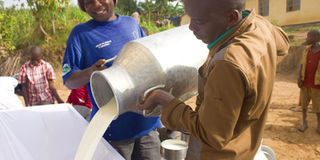Prime
Domestic milk sales grow by 20 per cent

Although consumption is still low, there has been an increase in consumption in the last nine months of 2020 compared to last year. PHOTO|FILE
What you need to know:
- Uganda’s milk demand stands at only 800 million litres per annum compared to 2.6 billion litres produced by the country annually.
- Government is urging companies involved in the dairy sector to see that they grow the domestic market to supplement their sales.
- Because liquid milk has a short life and it lacks market, companies are planning to engage more in production of milk powder, which has a shelf life of 24 months.
- There's also need to increase the capacity of drying plants from 20 tonnes per day to 50 tonnes.
There has been increased consumption of milk and dairy products in the domestic market, according to sector players.
Mr Seth Devendra, the Pearl Dairy managing director, said on the sidelines of the launch of the company’s new yoghurt flavour, there has been an increase in domestic market sales in 2020 compared to 2019.
“The sales have gone up by nearly 20 per cent compared to what we have been doing in 2019. After lifting of the Covid-19 restrictions, sales went up substantially,” he said.
However, he said, milk sales during the lockdown had dropped but recovered in June at the time when the lockdown was lifted.
The domestic market, Mr Devendra said, now consumes at least 50,000 litres per day up from 30,000 litres in 2019.
Domestic demand stands at only 800 million litres per annum compared to 2.6 billion litres produced by the country annually.
The lack of demand in the local market has been detrimental to, especially dairy farmers, who have witnessed a drop in farm gate prices due to restrictions put on Uganda’s milk products in countries where dairy products producers export.
Kenya has particularly restricted milk product exports from Uganda and has placed a 16 per cent levy on milk products from Uganda.
Lato, a product of Pearl Dairy, which claims to have the largest market share in the powdered milk segment and an overall 20 per cent share in the daily products industry, said that while it bought 142 million litres of milk from farmers in 2019, it has only bought about 32 million litres for the nine months of 2020.
According to Mr Devendra, while the company resumed exports to Kenya, only 10 per cent of its previous exports to the country are being realised.
“We are selling to Kenya but only 10 per cent of what we were selling in 2019.
They brought a quota system for Uganda so instead of taking maybe 10 trucks per day, they only allow two trucks,” Mr Bhasker Kotecha, the Midland Group chairman of companies, whose milk products had also been locked out of Kenya in April, said.
Innovation in the dairy sector, players have said, is a key denominator which will drive sales and increase in consumption.
Ms Evelyne Anite, the minister of state for Investment, said government is negotiating means of ensuring that the regional market is opened to Ugandan milk products.
“I am going to raise this issue with the President who has already negotiated for them one market. We believe that the issue with access for the regional market is going to be addressed and I commit on behalf on government that we are going to address this issue,” she said, adding government continues to look for market for e investors in other countries such as DR Congo, among others.




